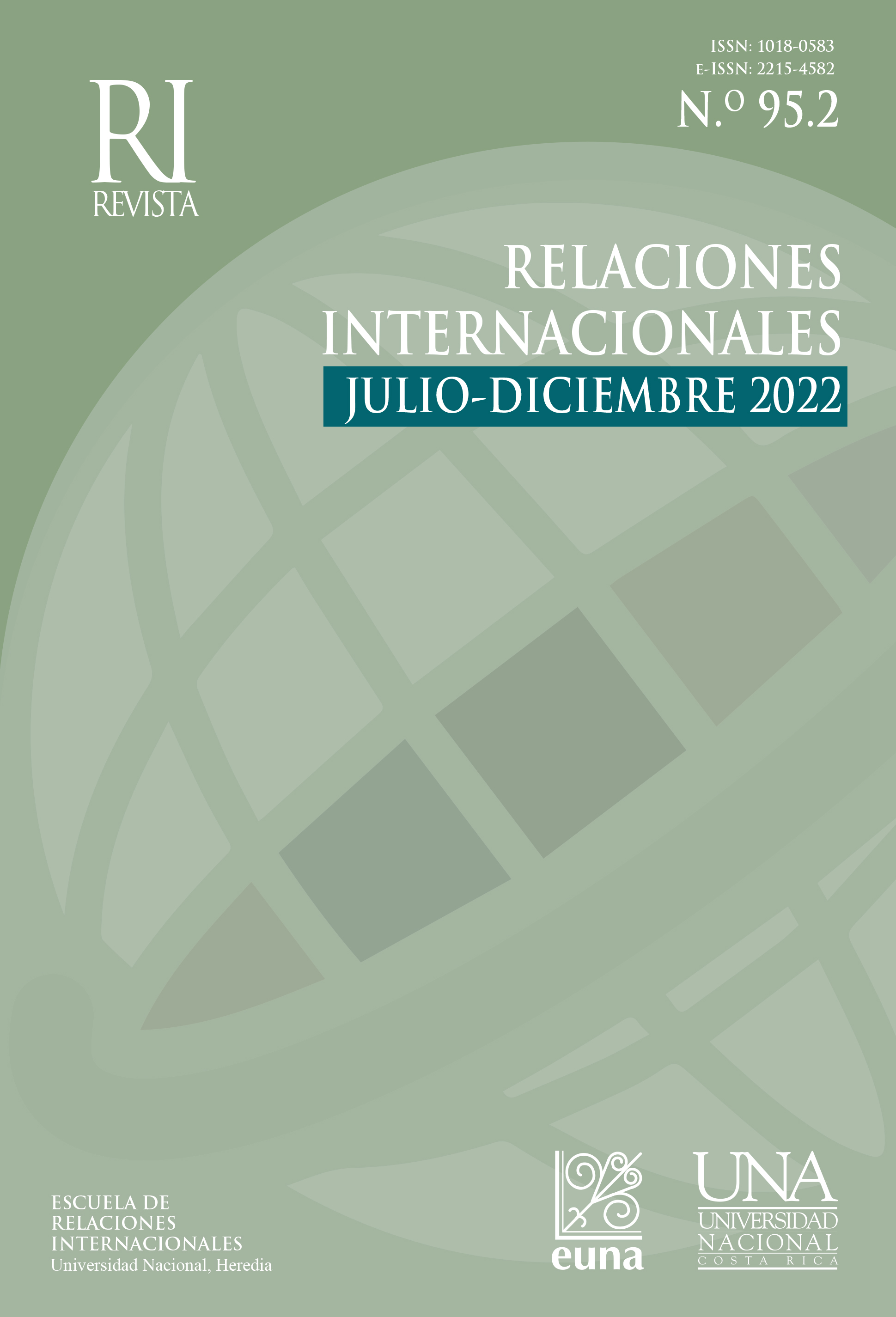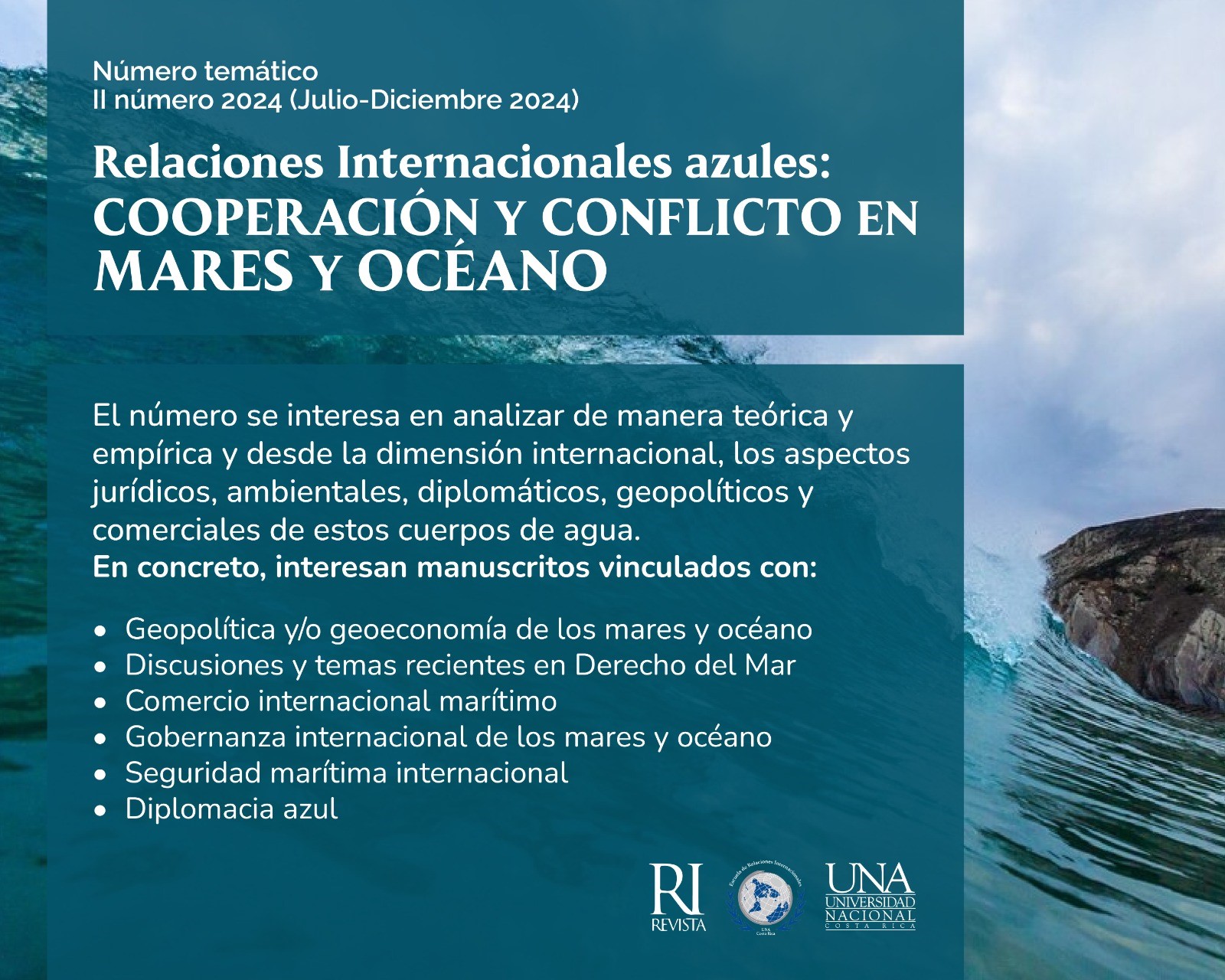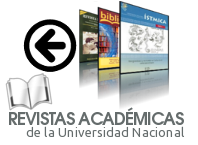COVID-19: Perspectivas desde los Estudios Internacionales
Palabras clave:
COVID-19, editorial, interdependencia, Relaciones Internacionales, salud global, seguridadResumen
Es en este contexto que el presente número temático 95.2, COVID-19: Perspectivas desde los Estudios Internacionales, representa el interés de la revista por ofrecer un espacio académico para comprender las dimensiones y posibles alcances que la pandemia ha tenido y pueda tener en la dinámica internacional.
De allí, el objetivo de presentar reflexiones que cubren aspectos no solo políticos, sino también sociales y económicos relacionados con esta pandemia; desde las múltiples alternativas analíticas que nos ofrecen las fascinantes, complejas, siempre cambiantes y retadoras Relaciones Internacionales, en una sociedad altamente conectada e interdependiente.
Referencias
Angus, C. (2022). The tide of the COVID pandemic is going out – but that doesn’t mean big waves still can’t catch us. The Conversation. Recuperado de https://theconversation.com/the-tide-of-the-covid-pandemic-is-going-out-but-thatdoesnt-mean-big-waves-still-cant-catch-us-185923
Beer, F. A. y Hariman, R. (2020). Nature Plays Last: Realism, Post-Realism, PostPandemic. E-INTERNATIONAL RELATIONS. Recuperado de https://www.eir.info/2020/06/07/nature-plays-last-realism-post-realism-post-pandemic/
Blanco, F., Enrrullahu, D. y Soto, R. (2020). Do Coronavirus Containment Measures Work? Worldwide Evidence. World Bank Group. Recuperado de https://openknowledge.worldbank.org/bitstream/handle/10986/34912/Do-Coronavirus-Containment-Measures-Work-Worldwide-Evidence.pdf;sequence=1
Brown, R. (2022). COVID-19 and International Political Theory Assessing the Potential for Normative Shift. Palgrave Macmillan. https://doi.org/10.1007/978-3-030-91952-8
CDC. (5 de enero de 2022). CDC Museum COVID-19 Timeline. Recuperado de https://www.cdc.gov/museum/timeline/covid19.html
Chand, R. (2008). The Global Food Crisis: Causes, Severity and Outlook. Economic and Political Weekly, 43(26/27), 115-122. http://www.jstor.org/stable/40278908
Davies, M. y Hobson, C. (2022). An embarrassment of changes: International Relations and the COVID-19 pandemic. Australian Journal of International Affairs, 0(0), 1-19. https://doi.org/10.1080/10357718.2022.2095614
Davies, S. E. y Wenham, C. (2020). Why the COVID-19 response needs International Relations. International Affairs, 96(5), 1227-1251. https://doi.org/10.1093/ia/iiaa135
Devereux, S. (2000). Famine in the Twentieth Century. IDS Working Paper, issue 105. Institute of Development Studies. https://www.ids.ac.uk/publications/famine-in-the-twentieth-century/
Drezner, D. W. (2020). The Song Remains the Same: International Relations After COVID-19. International Organization, 74(S1), E18-E35. https://doi.org/10.1017/S0020818320000351
Ettinger, A. (2022). Teaching World Politics in an Age of Crisis. En Szarejko, A.(ed), Pandemic Pedagogy Teaching International Relations Amid COVID-19 (pp. 3-19). Palgrave McMillan.
Gibson-Fall, F. (2021). Military responses to COVID-19, emerging trends in global civil-military engagements. Review of International Studies X, 1-16. https://doi.org/10.1017/S0260210521000048
Jasanoff, S. (2021). Humility in the Anthropocene. Globalizations, 18(6), 839-853. https://doi.org/10.1080/14747731.2020.1859743
JHU. (2022). COVID-19 Dashboard. Recuperado de https://coronavirus.jhu.edu/map.html
Kirke, X. (2020). Anxiety and COVID-19: The Role of Ontological Security and Myth. E-INTERNATIONAL RELATIONS. Recuperado de https://www.e-ir.info/2020/05/29/anxiety-and-covid-19-the-role-of-ontological-security-and-myth/
Kurki, M. (2021). Relational revolution and relationality in IR: New conversations. Review of International Studies, 1-16. https://doi.org/10.1017/S0260210521000127
Morales-Camacho, M. (2022). 2022: Lo impredecible como constante. Relaciones Internacionales, 95(1), 7-12. https://www.revistas.una.ac.cr/index.php/ri/article/view/16674
Pernecky, T. (Ed.). (2020). Postdisciplinary Knowledge. Routledge.
Sterling-Folker, J., Freyberg-Inan, A., Wilcox, L., Ozguc, U. y Shinko, R. E. (2021).
Forum: Thinking Theoretically in Unsettled Times: COVID-19 and Beyond. International Studies Review, 23(3), 1100-1125. https://doi.org/10.1093/isr/viab018
Szarejko, A. (Ed). (2022).Pandemic Pedagogy. Teaching International Relations Amid COVID-19. Palgrave McMillan. https://doi.org/10.1007/978-3-030-83557-6
The Economist. (2021). The new normal is already here. Get used to it.The Economist. Recuperado de 2022, de https://www.economist.com/leaders/2021/12/18/the-new-normal-is-already-here-get-used-to-it
WHO. (2022). Timeline: WHO’s COVID-19 response. Recuperado de https://www.who.int/emergencies/diseases/novel-coronavirus-2019/interactive-timeline#event-9
Descargas
Publicado
Cómo citar
Número
Sección
Licencia
Esta publicación está adscrita a Creative Commons; deben respetarse sus atribuciones y restricciones.
Los autores/as que publiquen en esta revista aceptan las siguientes condiciones:
- Los autores/as conservan los derechos de autor y ceden a la revista el derecho de la primera publicación, con el trabajo registrado con la Licencia Creative Commons Atribución-NoComercial-CompartirIgual 4.0 Internacional, que permite a terceros utilizar lo publicado siempre que mencionen la autoría del trabajo y a la primera publicación en esta revista.
- Los autores/as pueden realizar otros acuerdos contractuales independientes y adicionales para la distribución no exclusiva de la versión del artículo publicado en esta revista (p. ej., incluirlo en un repositorio institucional o publicarlo en un libro) siempre que indiquen claramente que el trabajo se publicó por primera vez en esta revista.
- Se permite y recomienda a los autores/as a publicar su trabajo en Internet (por ejemplo en páginas institucionales o personales) antes y durante el proceso de revisión y publicación, ya que puede conducir a intercambios productivos y a una mayor y más rápida difusión del trabajo publicado.
Revista de Relaciones Internacionales por Universidad Nacional de Costa Rica está bajo una Licencia Creative Commons Atribución-NoComercial-SinDerivar 4.0 Internacional









.png)



2.png)
